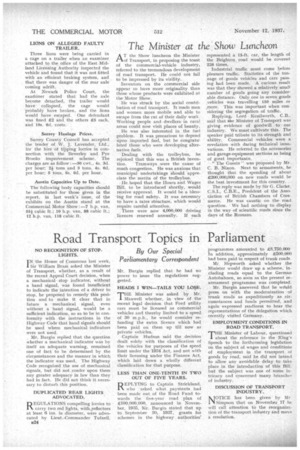Road Transport Topics in Parliament
Page 8

If you've noticed an error in this article please click here to report it so we can fix it.
NO RECOGNITION OF STOPLIGHTS.
I N the House of Commons last week, Sir William Brass asked the Minister of Transport. Whether, as a result of the recent Appeal Court decision, when a mechanical stop indicator, without a hand signal, was found insufficient to indicate the intention of a driver to stop, he proposed to remedy this position and to make it clear that in future a mechanical signal, even without a hand signal, would be a sufficient indication, so as to be in conformity with the instructions in the Highway Code that hand signals should be used where mechanical indicators were not used, , Mr. Burgin replied that the question whether a mechanical indicator was by itself an adequate warning, remained one of fact to be determined by the circumstances and the manner in which the indicator was used. The Highway Code recognized the use of mechanical signals, but did not confer upon them any greater adequacy in law than they had in fact. He did not think it necessary to disturb this position.
DUPLICATED REAR LIGHTS ADVOCATED.
REGULATIONS compelling lorries to carry two red lights, with‘reflectors at least 6 ins, in diameter, were advocated by Lieut.-Commander Tufnell.
1124
By Our Special Parliamentary Correspondent
Mr. Burgin replied that • he had no power to issue the regulations suggested.
HEADS I WIN—TAILS YOU LOSE.
THE Minister was asked by Mr. Maxwell whether, in view of the recent legal decision that Ford utility cars must be licensed as commercial vehicles and thereby limited to a speed of 30 m.p.h., he would consider refunding the extra licence which had been paid on them up till now as private vehicles.
Captain Hudson said the decision dealt solely with the classification of the vehicles for purposes of the speed limit under the 1934 Act, and not with their licensing under the Finance Act, which laid down a wholly different classification for that purpose.
LESS THAN ONE-TENTH IN TWO OUT OF FIVE YEARS.
REPLY1NG to Captain Strickland, 1'1 who asked what paynients had been made out of the Road Fund towards the five-year road plan of £100,000,000, announced in November, 1935, Mr. Burgin stated that up to September 30, 1937, grants for schemes in the highway authorities'
programmes amounted to 28,750,000 In addition, approximately 2500,000 had been paid in respect of trunk roads Mr. Hepworth asked whether the Minister would draw up a scheme, including roads equal to the German Autobahnen, so soon as the present rearmament programme was completed.
Mr. Burgin answered that he wduld press on with the modernization of trunk roads as expeditiously as circumstances and funds permitted, and again expressed readiness to hear the representations of the delegation which recently visited Germany.
EMPLOYMENT CONDITIONS IN ROAD TRANSPORT.
THE Minister of Labour, questioned about the reference in the Ki'ng's Speech to the forthcoming legislation on the subject of wages and conditions of employment in the transport• of goods by road, said he did not intend to allow any avoidable delay to take place in the introduction of this Bill, but the subject was one of some intricacy and concerned many brancheof industry.
DISCUSSION OF TRANSPORT INDUSTRY.
MOTICE has been given by Mr I. Simpson that on November 17 he will call attention tb the reorganization of the transport industry and move a resolution.








































